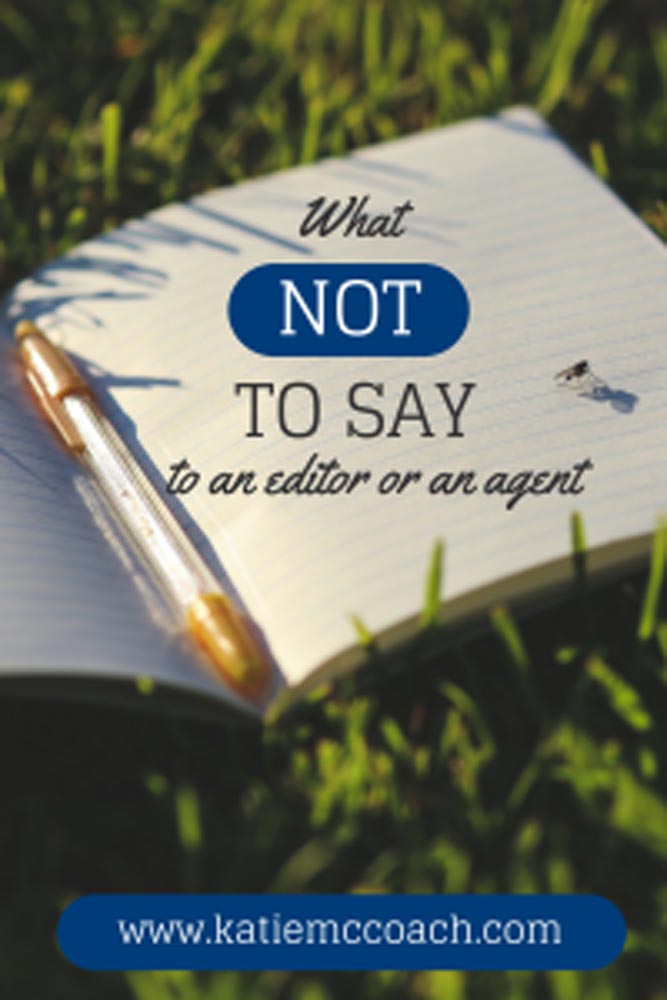 I recently I attended a lecture hosted by GLAWS, and the guest speaker for the day was literary agent, Steve Hutson.
I recently I attended a lecture hosted by GLAWS, and the guest speaker for the day was literary agent, Steve Hutson.
I’m sure you can guess the focus of the event (hint, see featured picture).
What NOT to Say to a Literary Agent (or Editor).
I like attending events such as this because on top of the joy of meeting new writers, it’s always nice to hear advice directly from the pros – the ones who actually do this for a living.
Here are some takeaways from the event that I’d like to share with you. Some of these I’d consider obvious – like don’t pitch a book to an agent in the bathroom, or don’t tell them your mother loved it. But some of these might not be so obvious, or maybe you hadn’t thought about it in the agent’s/editor’s perspective before.
Either way, I want you to have the tools to succeed.
When we talk about editors here it means acquisition editors in a publishing house, not a freelancer editor (aka moi).
The DON’Ts:
Don’t say your book is the next best seller.
Don’t be informal. Address the agent by name in your query (or in person). This means DO NOT send a mass email to a hundred agents and editors.
Don’t pitch a book in a genre the agent doesn’t accept.
Don’t say, “My book is for everyone.” That’s just not possible. No book is for everyone. Think about the audience that would actually want to read your book. Feel free to include that in your query – such as my book is for teenage boys in small towns.
Don’t ask an agent/editor to sign a NDA. It doesn’t benefit them to steal your idea. What are they going to do with it? They need the writers so they can sell the story. And agents will not go through extra hoops to read your work. They have hundreds, even thousands, of submissions to look through.
Don’t say your manuscript is X pages. Page total doesn’t help because formatting, font, spacing, etc. can affect the page length. DO share the word count.
*60-80k words is the ideal word count. Some agents will not look at an MS above or below this count. For example, a 105k-word MS is too high, and the reasoning is because it’s too expensive to produce a book of that length. Consider the editors, formatting, book production, printing, and more, that goes into the book.
Don’t start your query with a question. This has become too commonplace and too cutesy. Agents just want to get right into the meat of your work, not futz around trying to be clever.
Don’t say how many books you’ve self-published. Unless you’ve SOLD over 5k for one book, it how many books you’ve published before does not matter to an agent.
*97% of self-publish books sell less than 100 copies.
Don’t write your query in the character’s POV. This is something agents have recently stated they are not into. However, you DO want to show your character has a unique voice.
Don’t say your book is completely original and unlike anything else. No one’s book is 100% unlike anything else, even Shakespeare’s work is a version of the same stories told time and time again.
Don’t say you are the next “so and so”. Let the agent decide how to place your book when selling to an editor.
Don’t say you can get X celebrity endorsements that are clearly out of reach. That is a wish list. If you can get an endorsement from a celeb or someone important in your field/genre, state enough to show it’s actually obtainable.
The DO’s:
Do get a professional critique– at least three passes is what agent Steve Hutson recommends.
*Keep in mind an agent’s goal is to sell your book. When they read a submission, they are already trying to think of editors at X houses that would be interested. If an agent sees a book needs a lot of work, they can’t afford to spend the time working with you to make it better. Remember, they only make money when your book sells. Send them a book that is in the best shape possible.
Do list the (right) genre. And only list one genre. A book that is equal parts Sci-fi and Romance will not sell. Another lit agent, Paul Levine was also at this event and he shared a story about a book that was Sci-Fi/Romance. The editors in Sci-Fi wouldn’t take it because it had too much romance, and the editors in Romance wouldn’t take it because it was too sci-fi. It’s fine to say a book is Romance with sci-fi elements, or a Sci-Fi with romantic elements, but be sure it is clearly ONE genre first and foremost.
*Genre, in the most basic explanation means where on a bookstore shelf would this book belong? If you aren’t sure – go to a Barnes and Noble, look at the shelves and the labels for each, and figure where you’d put your book. If you still don’t know where your book belongs, you have reevaluating to do (see: get a critique).
Do follow the agent’s requests/directions. Each agent has a different set of expectations for queries, so be sure to read their requirements before submitting. Don’t start on the wrong foot by pitching them a book they would never read, or sending them items they didn’t ask for.
What has your experience been with editors or agents? Are you planning to pitch your book soon? Share in the comments below!
KATIE McCOACH is a freelance developmental book editor at KM Editorial working with authors of all levels to help them create their best story possible. Katie is a member of Romance Writers of America and the Editorial Freelancers Association. She has had essays published in TrainWrite and Kalliope and is currently writing a contemporary romance novel. For advice on editing, writing, and publishing visit her blog at https://katiemccoach.com/blog and be sure to also follow her on Twitter@KatieMcCoach.
Don’t miss a post! Subscribe to the KM Editorial monthly newsletter to be kept informed of contests, news for writers, editing advice, and more.


 Download your free copy of these 8 tried-and-true strategies to stop self-doubt and imposter syndrome as a writer. And, build the power to resist it in the future.
Download your free copy of these 8 tried-and-true strategies to stop self-doubt and imposter syndrome as a writer. And, build the power to resist it in the future.
Thank you for posting this advice. It is very helpful (especially the figures about self-published books! Phew!!)
I hate the genre question. It’s frustrating for people like myself who write stories or have ideas for novels just on the edge of a specific genre, but never really fit in. Kind of like John Crowley and his relationship with both Science Fiction and Fantasy.
Thanks for stopping by, Warwick!
The genre piece is tough, but it makes sense in the bookshelf standpoint, right? Do you know which shelf at a bookstore you’d want your book to sit? Does your book lean more towards one genre than another?
It sounds like this wouldn’t be your first choice, but have you considered self publishing? The great thing about indie publishing is that you get to make the rules. Two genres, why the heck not? 🙂 Always worth considering!
Thanks again for sharing! I wish you all the best in your pitching efforts.
Katie
I have an idea for a children’s book I want to write. I know I want advance paying publishers. I’m not sure if I need an agent. I would love to talk to you about you would recommend.
Ruth, children’s books are a bit outside of my scope of work, however if you want to get a pub deal, then yes, you’ll need an agent! Book a free call with me (see link on the request a quote page or about page) and I can point you in the right direction!
I have been taken advantage of Xulon press, in Florida. And book vine press in Illinois more or less. I have been r*ped over my three books that I have submitted to them, I have lost all contact no phone calls returned, no text return, the last that I heard as of yesterday I’m not going to get my money back ! do you know anything about brilliant books literature in California ? Thank you.
Ugh! What a disaster. Have you looked them up on Writer Beware? Check that site before signing anything with anyone, because they keep up to date on scams and red flag companies.
Thank you for the tips on what NOT to say to a Literary Agent. My first whacks at getting the agents I want has not been successful and part of the problem has to be due to violating one piece of your advice. My MS is 254K words. Obviously way beyond the 60 – 80K perfect publishing range.
Ben,
Thanks for stopping by! I’m so glad you found this article helpful.
Yes, I must admit that is quite a long ms. But what genre is it? Have you considered splitting the book into two parts (that can still stand alone as there own book, if necessary)?
If you ever need another set of eyes, or help cutting down some words, I’d love to talk.
Best of luck in your pitching! I’ll be rooting for you.
Katie
Thank you for sharing this useful information. I have not gotten to the agent/publisher part of my writing journey yet, but I have been TERRIFIED of it since I decided to go that far. This list of both don’t’s AND do’s has given me an element of confidence in that I have some idea of how to go about it and how to NOT get ejected from an office immediately.
I’m so happy you feel more confident in your journey! It’s a big step, but the more your know before diving into it, the better you’ll feel AND the better your chances. Good luck!
Dear Katie, So I am getting very close to sending out my query now and I am very enthousiastic about it. My novel is character written with certain actors in mind and I am also in the process of writing a screenplay. Is this something that I should mention when approaching an agent, in your opinion? Or is it better left out. Thank you so much, wonderfull blog! Take care!
Hi Ramon,
Great question! And first of all, kudos on writing a screenplay and querying your book!
This could go either way. I think it could be fair to mention you write screenplays as well–in sort of an off-hand remark, but not getting into the specifics of that work in any way. Or you can leave it out until you reach the next set of conversations with agents.
Best of luck in querying!
Thank you, Katie! On all fronts! This was just the kind of advise I was looking for. I appreciate it. Thanks for your time! All my best!
Thank you for sharing your knowledge, it has been helpful to me. My one question is if it is proper to submit to more than one agent in the same agency?
Good question. Typically, the answer is no. Most agencies will list on their website something like “a pass from one of us is a pass from the entire agency.” If that information isn’t there, you may risk submitting to multiple at the same agency, but quite honestly, if they work together, the chances are they know when something would be a good fit for another agent there–and if that’s the case, why wouldn’t they pass the work on?! So my recommendation is to lean toward no simultaneous submissions to the same agency at the same time. However, if it’s been several months and no response?…well, I’ll leave that to you!
This guide is very helpful. I’m a writer shopping for reputable literary agents.
Hello Katie, I just finished writing my book, and the next stage is publishing it. Could you support me in achieving this goal? Best regards.
Reach out to me via the contact form on my website and I’d be delighted to see how we can work best together.
I suspect I am being scammed by someone who is misrepresenting themselves as a Literary Agent for Page Turner. He states he has a copy of my unpublished children’s book and manuscript which he got from another publishing agency. He also initiated these emails with me about getting my book picked up by Random House. Is there any way to tell if this is real or not?
Well that’s no good!
I would do a couple things.
1. Search for them or the company on Write Beware https://writerbeware.blog/
2. Look up their company/LinkedIn/agent info and see what books they’ve repped and cross-check them, and also look into the company in general.
3. Contact the company they say they are with to ask for more info or confirm their credibility.
For what it’s worth, agents within the same agency will share a submission with another agent if it seems like a better fit, but not with another publishing company or agency.
Hi Katie, I’ve dabbled in poetry, fanfiction online, have made countless notes of unpublished stories I want to share for almost 20 years now and I’ve always wanted to submit a story to be published. Could you recommend any literary agents who are interested in fantasy/romance genres? I’ve spent so many hours over the last 8 years working one one particular tale to the point of obsession and I would love a professional opinion whether or not it’s the right fit for the bookworld and would like your thoughts on whether a pseudonym would be better to use than my own name.